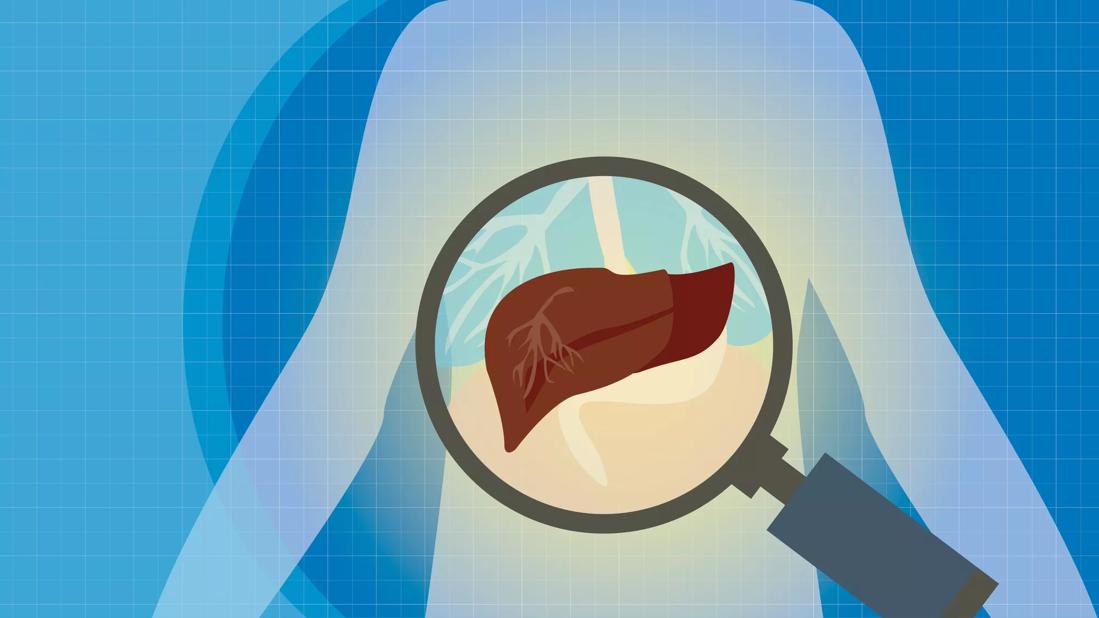Diet, exercise and medications can help slow the progressive liver disease

Image content: This image is available to view online.
View image online (https://assets.clevelandclinic.org/transform/0e8935e3-6a75-4030-b0c9-6ee8a882c90d/liver-exam-care-491938420)
Magnifing glass over liver in the body
Primary biliary cholangitis (PBC) doesn’t just go away. It’s a chronic and progressive condition that damages and undermines your liver. Complications from PBC can shorten your life expectancy.
Advertisement
Cleveland Clinic is a non-profit academic medical center. Advertising on our site helps support our mission. We do not endorse non-Cleveland Clinic products or services. Policy
But many people live for years with the disease by making daily decisions that may keep their liver (and overall body) healthier for longer.
Gastroenterologist Dian Chiang, MD, explains how you can be proactive in managing PBC.
Your liver is a spongy, wedge-shaped organ that’s about the size of a football. It handles hundreds of different critical tasks for your body, including the creation of bile to help you digest food.
If you have PBC, the flow of bile from your liver to your digestive system gets gummed up as inflammation narrows passageways known as bile ducts, says Dr. Chiang. Bile that can’t get through backs up and damages your liver.
This can lead to permanent scarring (cirrhosis) and eventual liver failure, as well as other health issues.
Here’s what you can do to slow that process.
Bile produced by your liver helps your body break down fats in the food you eat. If you have PBC, limiting foods that need bile for digestion should be a priority when selecting what hits your plate.
Following the Mediterranean diet typically works well for people with PBC, given its focus on plant-based foods and healthy fats, shares Dr. Chiang. That means building an eating plan around:
Advertisement
If you have PBC, it’s best to limit or avoid foods high in saturated fats, sugar or sodium. Alcohol can put extra stress on your liver and should be minimized, too.
Learn more about foods that fit best into a PBC diet.
Research shows that approximately 30% of people with PBC develop osteoporosis (or a gradual weakening of the bones). It’s one of the more common complications of the liver disease.
Adopting an activity regimen early after a PBC diagnosis can guard against the loss of bone density and muscle mass. “We recommend both aerobic and resistance [strength] exercise,” says Dr. Chiang.
Regular exercise also may be able to counteract feelings of fatigue that come with PBC. The reason? Movement increases blood circulation, which feeds your muscles oxygen to function better. Activity also causes your body to release a jolt of energy-building hormones.
Any development of osteoporosis leaves you more vulnerable to broken bones if you lose your balance and hit the ground. “A fracture from a fall is one of the biggest things that can decrease quality of life with PBC as it advances,” notes Dr. Chiang.
Exercise, of course, can help you maintain strength and agility to avoid a stumble. But Dr. Chiang also recommends looking for potential tripping hazards in and around your home.
“You can minimize your falling risk by paying attention to your home environment,” he says.
Ways to fall-proof your home include:
It’s important to regularly see a liver specialist for check-ups to monitor the disease and look for any signs of progression. Different medications and treatments are available to address your specific needs.
“There’s no one-size-fits-all approach,” emphasizes Dr. Chiang. “There are several medications available for PBC, so talking with your liver doctor is the best way to figure out a regimen and dosages that work best for you.”
Your healthcare provider also can test for vitamin deficiencies and recommend diet changes or supplements to address any issues.
PBC often progresses slowly, and its advancement can be kept to a minimum by adjusting your routine. The combined effect of eating healthier, regularly exercising and keeping up with your medications can make a difference.
“While there’s not yet a cure for PBC,” says Dr. Chiang, “there are things you can do to keep it from affecting your quality of life.”
Advertisement

Sign up for our Health Essentials emails for expert guidance on nutrition, fitness, sleep, skin care and more.
Learn more about our editorial process.
Advertisement
Itching is a common effect of living with primary biliary cholangitis — but certain medications can help
For example, PBC can cause vitamin deficiencies — but isn’t caused by vitamin deficiencies
Dietary choices can help slow the progressive disease or make it worse
Consume caffeinated foods and drinks in moderation, if you have them at all
OTC meds, rest, fluids and an anti-inflammatory diet can help you get through big and small weather changes
Getting back to normal after a head injury takes time — and patience
Honey, humidity and the right OTC meds can help bring on cough relief
Eczema triggers are different for everyone, but there are some common ways to manage flare-ups, like using a humidifier and fragrance-free creams
Although it could be used as a moisturizer, this new trend is not recommended
Communicating clear limits helps protect your time, energy and emotional well-being
High cholesterol can be genetic, but testing and treatment can lower your heart disease risk